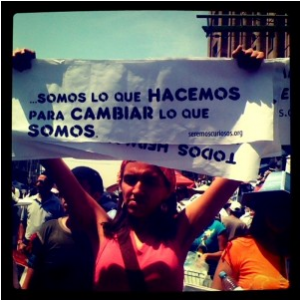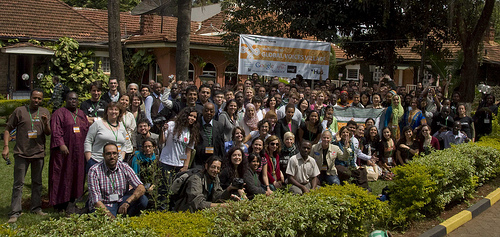Five years ago, a few forward-looking members of the GV community, led by Sami ben Gharbia, began Global Voices Advocacy. They understood that rights to free expression and privacy of netizens were being challenged by governments, companies, and other powerful actors — and they recognized that GV was uniquely positioned to do something about it. The site has since become a critical information and activism center for netizens whose work and lives are at risk, and I’m thrilled to be taking on a full-time role in this effort.

Image from Digitale Gesellschaft.
Defending User Rights and Promoting Strong Policies for the Internet
Since GVA began, we have seen that political leaders of many persuasions see technology in the hands of citizens as a potential threat to their power and stability. Some governments are punishing bloggers for their words with harassment, arrest, torture, and even death. Others are creating policies that imperil users’ online rights of free expression and privacy – rights that are protected by the Universal Declaration of Human Rights. This is happening all over the world, from cybercrime regulations that allow governments to spy on user communications, to laws like SOPA, to international trade agreements that limit users’ access to knowledge. These restrictions are not limited to a few draconian regimes. It is a broad field in which most of the world's governments are seeking new ways to control how citizens use the Internet.
As Hisham described in his open letter to the community late last year, GVA is positioned to promote global digital rights in ways no one else can. In our effort to amplify the voices and stories of people around the world that are less commonly heard in mainstream media, we have become a robust network of savvy and human rights-minded Internet users and activists. A brief glance at GVA illustrates just how powerful this can be in the field of digital rights advocacy.
This year, GVA authors in Mexico have shown how drug-related crime has made violent threats against journalists and bloggers commonplace, leaving them in fear of surveillance not only by government authorities, but by drug cartels as well. Our Netizen Report team sounded the alarm when the Ethiopian government blocked Tor, the onion routing network that allows users to anonymously browse and exchange information online. Our East Asia team gave a netizen’s perspective on South Korea’s short-lived “real name registration” law that required users to provide sensitive personal information just to post comments on high-traffic websites.
Mobilizing the GV Network
It’s easy to see how our model distinguishes us from most media that cover these issues: our authors are drawing from online communities that also have real-world ties, and writing about places they know very well – usually their own countries. In any given country, the policies that apply to the Internet reflect the priorities and ideals that the government has for its citizens. GVers recognize this, and they know that in order to understand an abuse, an arrest, or to really see where a policy comes from, it is critical to consider that country's politics, its economy, and even its history. And they are perfectly positioned to take this on.
In my new role at the GVA project, I want to work to leverage our great strength – our networks, our knowledge, and the voices we seek to amplify. The overarching goal is to make our site a central space for digital rights advocates and enthusiasts eager to learn about emerging issues, discover advocacy efforts, and become engaged with our work as new challenges emerge and old fights continue.
Ideas for 2013
Moving ahead, we are eager to develop new partnerships with digital rights advocacy groups around the world. When advocates want to show lawmakers how a new cybercrime law could threaten the privacy or free speech rights of regular users, they often argue in the abstract. By building partnerships with such groups we can help fuel their arguments with concrete stories and examples of how laws affect real users.
In more practical terms, a revamp of content and feeds on the GVA homepage can make it easier for users to learn more about the issues we cover. Introducing space for short update-style posts would allow us to cover emerging threats to free expression and privacy online as soon as they arise. Greater integration of information about projects like Threatened Voices would bring more users to the site and would raise the profile of these projects.
Many members of our community are familiar with our guides on security, safety, and protecting your blog, but there is much we can do to highlight these materials and make sure that they’re reaching the activists who need them most. These are just a few ideas that we’re hoping to move forward with in 2013 – Hisham and I are eager to hear more from the community and continue discussions about what all we can accomplish in the coming year.
The GV Family
When I joined GV in October of 2010, I immediately felt a part of the dynamic kinship that this makes our community so unique. I continue to marvel at how, from my very first post, I felt embraced as a member of this decentralized digital family, even though I barely knew anyone and was surprised that other authors were so eager to include me in this bond.
At the Nairobi Summit this past summer, I found that my abstract notion of the GV family was no illusion. I saw the unwieldy yet endearing chatter of our authors’ email list take shape in real life. I got to know colleagues from Venezuela, Pakistan, Russia, Mexico, and many other countries. I spent hours with my editor, a Boston-based Puerto Rican-Iranian sociologist, and my main partner in Cuba coverage, who lives and writes on the island — something that seemed unimaginable just months before. Many of the posts that community members wrote after the Summit reflected how the GV bond is built on many things – trust, mutual understanding and respect, and openness to new ideas. In the same vein, I believe we are a strong network and community because we do all care about certain fundamental rights that allow us to do the work that brought us all together – to express ourselves online and feel safe doing it.
Onward!
The Summit left me feeling more passionate than ever about protecting and promoting digital rights–and it proved to me just how powerful the GV community can become in supporting digital rights advocacy efforts around the world. I could not be more excited about what we can build as a community, and I can’t imagine a better person than Hisham to lead us in this effort. Here’s to GVA and defending the open Internet in 2013!






1 comment